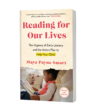I gave the Senior Convocation Address for Richmond Public Schools this year and I count the experience among the great privileges of my life. I accepted the challenge of addressing 2,000 (2,000!) people—graduating seniors from eight city high schools and their friends, family and teachers—because of a William James quote that sits on my desk: “Act as if what you do makes a difference. It does.”
Dressed in regalia from robe to mortarboard and flanked by school and city officials, I took in the contrast between the girth of the Richmond Coliseum and the elegance of the ceremony. Somehow the interplay between the pomp (Mendelssohn’s “War March of the Priests”) and the circumstance (a hulking sports arena) felt appropriate. It mirrored my charge as a speaker—to say something lofty enough to suit the occasion yet concrete enough to make a real-world impact. I was addressing a diverse body of students headed for the rigors of college, the military and the workforce.
The mood felt celebratory, but grounded. I urged the students to soak in the support from their schools, friends and families that abounded in the stadium. Appreciate their high expectations for you, I said, but know that your expectations for yourself matter more and that your habits matter most of all.
Here’s the speech:
As the speaker today, I’m supposed to impart some wisdom that will help you on the next leg of your journey. I’m expected to be knowledgeable, uplifting and leave you with a few takeaways.
But after hearing countless speeches like this, I know that it’s most important that I leave you with just one piece of sound advice.
One thing that I know to be true.
In a matter of days, perhaps even minutes, you will forget my name and the bulk of my message but I hope this one insight, this one idea, this one truth sticks with you for a lifetime.
We are gathered here today because we are so proud of you for having the tenacity and perseverance to earn your high school diploma, despite the temptations and distractions that pull far too many off the path. It’s an achievement to sit where you sit with a solid education in your back pocket and future full of possibility ahead.
So, the question becomes, what are you going to do with the education you’ve received?
We have really high expectations for each and every one of you. We want you to be happy, to find meaning in your life and to make a unique contribution to the world. We expect you to bring your intelligence, your drive and your creativity to bear on the challenges our city and country and world face.
And, you can do it.
But our expectations for you matter only so much. What matters more are your expectations for yourself.
What do YOU expect to do with your life?
What do YOU expect to do with your education, your talents, your gifts?
Notice that I did not ask what you want to do with your life. Instead I asked what you expect to do with your life. The difference is important.
You may want to be a millionaire. Who doesn’t? But is that what you expect? Someone who merely wants to be a millionaire plays the lottery every week and hopes to hit the jackpot. But someone who expects to be a millionaire isn’t leaving it up to chance. She’s working at it. She’s focused on making money and saving money, every day.
So, again I ask, what do you expect of your life? This is really important, because people rarely get more than they expect.
Do you expect to graduate from college with the knowledge and network to get a job and meaningfully contribute to the community? Or, do you merely want to go to college?
Do you expect to lead a business or a nonprofit to meet the challenges of the future? Or, do you merely want a title and a paycheck?
Aim high. Take the risk of disappointment. You may not get everything that you expect in life, but you will certainly get more than you would if you had no expectations at all. Numerous studies across various fields have found that raising expectations raises performance.
Raise your expectations. Raise your performance. Always remember that you have the power to set your own expectations and you should set them high.
It’s wonderful that so many teachers, family and community members are here to affirm you today. But I’m here to tell you that if you never get another rousing round of applause,
If you never have another keynote address aimed specifically at you,
If another choir never sings your praises, you still get to choose whether or not you think you’ll be successful, whether or not you expect to be successful. That much is entirely up to you.
“I am the greatest,” Muhammed Ali told himself. “I am the greatest. I said that even before I knew I was.”
But expecting your very best is just a start. There’s something that matters even more than your expectations: your habits.
Which leads me to the most important thing I can share with you today. Are you ready? If you hear nothing else I say, please hear this: Your habits must match your expectations. It’s the only way to thrive. No one achieves ambitious goals by accident.
This alignment of habits and expectations separates delusional people from successful ones. The delusional person thinks they can win without work and the successful person builds achievement incrementally, stringing together many days of good habits—working hard, listening well, doing things the right way.
As a reality check, get in the habit of asking yourself if your habits really match your expectations. Ask yourself now: “Do my habits match my expectations?” According to Jerome Allen, a former NBA player and the basketball coach at the University of Pennsylvania, this is the most important reminder he can give his players.
Many college players want to bolster their stats, win championships and accrue the benefits of on-the-court success, but most don’t set themselves up to thrive. They don’t maintain championship habits everyday. They aren’t consistently doing the little things that make a big impact.
Somewhere there is a college basketball player who averages two points a game, refuses to follow his coach’s plan, disrespects his teammates AND still thinks he’s going play in the NBA. Most likely, he’ll end up watching the NBA from his couch, because he never made winning a habit.
But there are also kids like Troy Daniels who many of you know of. Troy averaged 2 points per game his freshman and sophomore years at VCU. But he kept working on his game, building his confidence and listening to his coaches. He graduated as the school’s all-time leading three-point scorer. Then after college, he went to work in the NBA’s developmental league. And develop he did. By play-off time this year, he was a member of the Houston Rockets, knocking down 3-point shots in the NBA.
Good habits, not idle desire, got him there.
The same rules apply for all of us.
Let’s try another example. Many of you want to go to college (either in the fall or down the road). Many of you want to earn advanced degrees in law, business, medicine, engineering. But do you really expect to do those things? And, do you know what habits you need to cultivate to get there? Do you know what little things you need to do day in and day out to put yourself in a position to meet your high expectations?
Even if you think you are done with school forever and never want to sit in another formal classroom, you’re going to have to keep learning on the job or in the world just to survive. You’re going to have to keep building your capacity to grasp and apply new information to make it.
No matter your path, good habits make life easier for you. There are dozens of little habits that can help you in any pursuit—things like being punctual, being courteous, looking people in the eye, eating well, working out.
But there are other habits that you don’t even know of yet. Study habits and work habits that separate the best people in your field from the average ones. You have to make it your business to discover those habits and then own them in your own life.
Two simple things can help you: Asking questions and reading widely.
When I want to learn more about something, I ask someone who knows. This is important. Don’t just ask anybody who happens to be around. Don’t ask the most talkative person you know or the person who thinks they know it all. Ask someone who would know.
Don’t ask unhealthy people for fitness advice.
Don’t ask unemployed people for resume tips.
Don’t ask broke people for financial advice.
Ask someone who knows.
Sometimes you may be venturing into an area where no one you know has gone before. That’s when you scour books and articles to get the pointers you need until you meet the people who can help you.
Some of you may not like to read. Do it anyway. I can say with almost 100% certainty without knowing any of the specifics of your particular hopes, dreams and expectations that developing a reading habit will be worth the effort.
At my mom’s retirement party years ago, I remember her talking about her winding career path and venturing into fields that she didn’t even know existed when she was a poor child growing up in Louisville, Kentucky.
She said, “I read my way out of poverty before I worked my way out of it.”
That always stuck with me. Whether you are working to escape literal poverty or some figurative poverty—a lack of connections, information, or support—you can read your way out of it. You have the power right now to set high expectations for yourself.
As the convocation draws to a close, thank your friends, family, school and community for whatever positive expectations they have set for you. But know that your expectations for yourself matter much more and that your habits matter most of all.
Congratulations, Richmond seniors.
Now’s your time to expect greatness and build habits to match.
Please remember that one thing.
Thank you!


